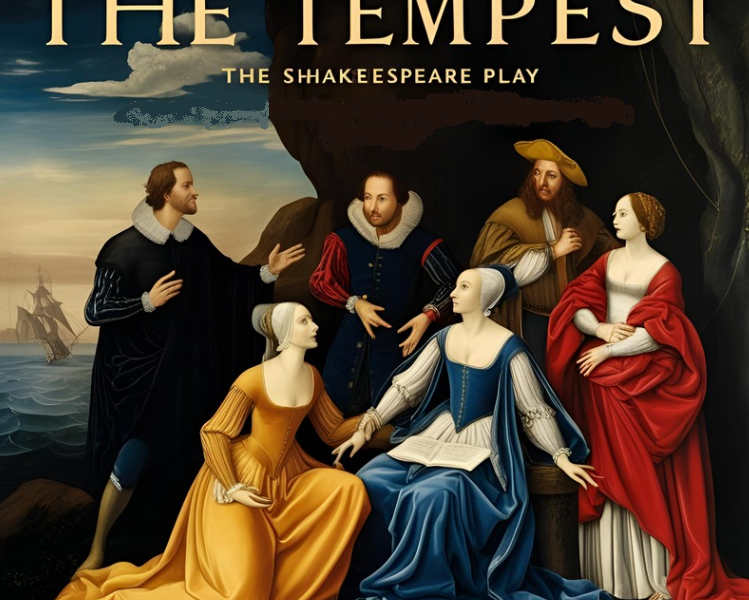How to Get a Grade 9 in The Tempest – Top Quotes, Themes and Tips for GCSE English Literature
If you’re studying The Tempest for your GCSE English Literature exam, you’re in the right place. Whether you’re aiming for a solid pass or shooting for a Grade 9, mastering this Shakespearean play is completely achievable — and this guide will show you how.
In this article, we’ll break down the top quotes, key themes, and Grade 9-level analysis to help you revise smarter and write better essays. We’ll also give you exam tips, including how to structure responses and impress the examiner with insight and originality.
📖 What is The Tempest About?
Written by William Shakespeare in around 1610, The Tempest is a play about magic, betrayal, forgiveness, power, and freedom. It tells the story of Prospero, a wronged Duke who uses his magical powers to take revenge and ultimately chooses reconciliation.
The play begins with a literal storm (the tempest), conjured by Prospero to bring his enemies to the island where he lives with his daughter Miranda. From there, it becomes a tale of revenge, justice, and redemption.
🎯 Why Is The Tempest So Popular in GCSE English?
The Tempest is rich with dramatic language, fascinating characters, and complex themes. It’s also full of metaphors and imagery that make it ideal for analysis. Best of all, it’s a great opportunity to show off high-level thinking about colonialism, power, and the human condition.
If you want a Grade 9, it’s not enough to just know what happens. You need to:
-
Learn high-impact quotes
-
Understand Shakespeare’s intentions
-
Explore alternative interpretations
-
Make clear, original points
-
Back up your ideas with detailed analysis
🧠 Grade 9 Themes in The Tempest
Let’s look at the biggest themes and how to write about them at a high level.
1. Power and Control
Power is at the heart of the play — magical, political, and colonial.
Key Quotes:
-
“I must obey: his art is of such power” – Caliban (Act 1, Scene 2)
-
“This rough magic I here abjure” – Prospero (Act 5, Scene 1)
Grade 9 Analysis:
Prospero’s magic gives him god-like control over the island and its inhabitants. His manipulation of events shows how power can corrupt — but also how it can be relinquished. A top-grade essay would explore how Shakespeare uses Prospero as a symbol for absolute authority, and how his journey mirrors a deeper moral transformation.
👉 Tip: Make links to Jacobean beliefs about kingship and divine right. Ask: Is Prospero a just ruler, or a tyrant?
2. Colonialism and the “Other”
Caliban, the island’s native inhabitant, represents the colonised figure — viewed by Europeans as savage and sub-human.
Key Quotes:
-
“This island’s mine, by Sycorax my mother” – Caliban (Act 1, Scene 2)
-
“You taught me language; and my profit on’t / Is I know how to curse” – Caliban
Grade 9 Analysis:
Caliban is complex. He’s brutal, yes, but also eloquent and oppressed. A Grade 9 answer might explore how Caliban’s portrayal reflects Elizabethan attitudes toward colonisation — and how modern audiences might see him differently. You could argue that Shakespeare critiques colonialism by showing the harm caused by Prospero’s domination.
👉 Tip: Mention postcolonial readings — how might this play reflect or challenge the ideology of empire?
3. Forgiveness and Redemption
Prospero’s final act is one of mercy: he forgives those who betrayed him.
Key Quotes:
-
“The rarer action is / In virtue than in vengeance” – Prospero (Act 5, Scene 1)
-
“Let us not burden our remembrance with / A heaviness that’s gone” – Prospero
Grade 9 Analysis:
This theme ties into Christian values of forgiveness. Prospero’s growth reflects a move from control to compassion, showing moral development. A top student might explore whether Prospero’s forgiveness is genuine or strategic. Is it a sign of strength, or resignation?
👉 Tip: Discuss the motif of imprisonment and release — physical and emotional.
4. Illusion vs Reality
Much of the play revolves around deception, illusion, and the theatrical nature of life itself.
Key Quotes:
-
“We are such stuff / As dreams are made on” – Prospero (Act 4, Scene 1)
-
“The cloud-capp’d towers… shall dissolve” – Prospero
Grade 9 Analysis:
This theme blurs the line between the magical and the real, and reflects on the ephemeral nature of life. Shakespeare, nearing the end of his career, may be using Prospero as a stand-in for himself — saying goodbye to the theatre. High-level responses can discuss metatheatre, and how the play reflects on its own performance.
👉 Tip: Link to the idea of performance and masks. What does the audience see, and what is hidden?
5. Freedom and Servitude
Nearly every character seeks freedom — Ariel from servitude, Caliban from oppression, Miranda from isolation.
Key Quotes:
-
“Is there more toil? Since thou dost give me pains, / Let me remember thee what thou hast promised” – Ariel
-
“To the elements / Be free” – Prospero (Act 5, Scene 1)
Grade 9 Analysis:
Freedom is portrayed as both physical and spiritual. Ariel’s servitude is loyal but not without bitterness, while Caliban’s is forced. These contrasts show how freedom is experienced differently depending on power and status.
👉 Tip: Compare Ariel and Caliban — what does their treatment say about Prospero and the theme of control?
🗣️ Top The Tempest Quotes Every GCSE Student Should Know
Here are 10 quotes that are perfect for memorising and analysing in your exam:
-
“We are such stuff / As dreams are made on” – Life is temporary, like theatre or magic.
-
“The rarer action is / In virtue than in vengeance” – Forgiveness is nobler than revenge.
-
“This island’s mine, by Sycorax my mother” – Caliban’s claim to the island.
-
“You taught me language; and my profit on’t / Is I know how to curse” – The legacy of colonisation.
-
“To the elements / Be free” – Final line: Ariel’s liberation.
-
“I’ll break my staff… I’ll drown my book” – Prospero gives up magic.
-
“Hell is empty and all the devils are here” – Chaos during the storm.
-
“What’s past is prologue” – Everything that’s happened sets the stage.
-
“O brave new world / That has such people in’t” – Miranda’s naïve wonder.
-
“Let your indulgence set me free” – Prospero breaks the fourth wall.
📚 How to Structure a Grade 9 Essay
Here’s a sample structure to use in your essays:
📌 Introduction
-
Briefly answer the question.
-
Mention key themes and characters.
-
Offer a clear, thoughtful thesis.
📌 Main Paragraphs (x3-4)
-
Point: Make a clear point that answers the question.
-
Evidence: Use a well-chosen quote.
-
Analysis: Zoom in on language, form, and context.
-
Link: Tie back to the question and theme.
-
Bonus: Add a critical viewpoint or alternative interpretation.
📌 Conclusion
-
Sum up your argument.
-
Restate your thesis with confidence.
-
Mention why the theme is still relevant today (exam boards love this!).
📝 Sample Grade 9 Paragraph
Question: How does Shakespeare present the theme of power in The Tempest?
Shakespeare presents power as both magical and political, often showing how it can be abused. When Caliban says, “I must obey: his art is of such power”, the word “art” reflects Prospero’s control through magic, but also suggests a kind of manipulation or trickery. The phrase “must obey” shows Caliban’s lack of agency, positioning him as a victim of colonial control. A modern audience might read this as a critique of imperialism, especially as Caliban originally ruled the island. Meanwhile, Prospero’s later decision to renounce magic — “this rough magic I here abjure” — indicates a shift from domination to morality. Shakespeare seems to argue that true power lies not in control, but in the choice to forgive.
👉 This answer uses language analysis, context, and critical perspective — all signs of a Grade 9 response.
📈 How to Revise The Tempest Like a Top Student
-
Make flashcards with key quotes and themes.
-
Write practice paragraphs using past paper questions.
-
Record yourself summarising themes.
-
Use colour-coded annotations for themes, language, and context.
-
Test yourself regularly — retrieval practice is key.
-
Watch live performances (e.g. RSC or Globe) to see new interpretations.
-
Teach someone else — if you can explain it clearly, you know it well.
⚠️ Common Mistakes to Avoid
-
❌ Writing the plot instead of analysing the text.
-
❌ Ignoring historical and cultural context.
-
❌ Using quotes without analysing them.
-
❌ Making one-sided arguments.
-
❌ Forgetting to answer the question directly.
🏁 Final Tips to Secure a Grade 9
-
Be original — show your own opinion.
-
Be precise — zoom in on key words and techniques.
-
Be thoughtful — explore more than one interpretation.
-
Be clear — structure your points well and stay on track.
-
Be ambitious — don’t just say what Shakespeare does, explain why.
📌 Final Thoughts
The Tempest is a magical, complex, and deeply meaningful play that gives you everything you need to succeed in GCSE English Literature. By learning key quotes, understanding major themes, and writing with insight, you can aim confidently for a Grade 9.
Now it’s your turn — pick a past paper question, try writing a paragraph, and start building that Grade 9 response today.
Good luck! 💫


